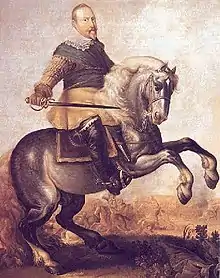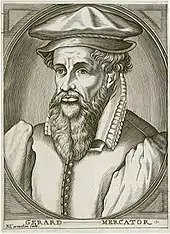1594
1594 (MDXCIV) was a common year starting on Saturday of the Gregorian calendar and a common year starting on Tuesday of the Julian calendar, the 1594th year of the Common Era (CE) and Anno Domini (AD) designations, the 594th year of the 2nd millennium, the 94th year of the 16th century, and the 5th year of the 1590s decade. As of the start of 1594, the Gregorian calendar was 10 days ahead of the Julian calendar, which remained in localized use until 1923.
| Millennium: | 2nd millennium |
|---|---|
| Centuries: | |
| Decades: | |
| Years: |
| 1594 by topic |
|---|
| Arts and science |
|
| Leaders |
|
| Birth and death categories |
| Births – Deaths |
| Establishments and disestablishments categories |
| Establishments – Disestablishments |
| Works category |
|
| Gregorian calendar | 1594 MDXCIV |
| Ab urbe condita | 2347 |
| Armenian calendar | 1043 ԹՎ ՌԽԳ |
| Assyrian calendar | 6344 |
| Balinese saka calendar | 1515–1516 |
| Bengali calendar | 1001 |
| Berber calendar | 2544 |
| English Regnal year | 36 Eliz. 1 – 37 Eliz. 1 |
| Buddhist calendar | 2138 |
| Burmese calendar | 956 |
| Byzantine calendar | 7102–7103 |
| Chinese calendar | 癸巳年 (Water Snake) 4290 or 4230 — to — 甲午年 (Wood Horse) 4291 or 4231 |
| Coptic calendar | 1310–1311 |
| Discordian calendar | 2760 |
| Ethiopian calendar | 1586–1587 |
| Hebrew calendar | 5354–5355 |
| Hindu calendars | |
| - Vikram Samvat | 1650–1651 |
| - Shaka Samvat | 1515–1516 |
| - Kali Yuga | 4694–4695 |
| Holocene calendar | 11594 |
| Igbo calendar | 594–595 |
| Iranian calendar | 972–973 |
| Islamic calendar | 1002–1003 |
| Japanese calendar | Bunroku 3 (文禄3年) |
| Javanese calendar | 1514–1515 |
| Julian calendar | Gregorian minus 10 days |
| Korean calendar | 3927 |
| Minguo calendar | 318 before ROC 民前318年 |
| Nanakshahi calendar | 126 |
| Thai solar calendar | 2136–2137 |
| Tibetan calendar | 阴水蛇年 (female Water-Snake) 1720 or 1339 or 567 — to — 阳木马年 (male Wood-Horse) 1721 or 1340 or 568 |
.jpg.webp)
June 5: First voyage of Willem Barents in search of the Northeast Passage.
Events
January–June
- March 21 – Henry IV enters his capital of Paris for the first time.
- April 17 – Hyacinth of Poland is canonized.
- May
- June 5 – Willem Barents makes his first voyage to the Arctic Ocean, in search of the Northeast Passage.
- June 11 – Philip II of Spain recognizes the rights and privileges of the local nobles and chieftains in the Philippines, which paves the way for the stabilization of the rule of the Principalía.
- June 22–23 – Anglo-Spanish War: Action of Faial – In the Azores, an English attempt to capture the large Portuguese carrack Cinco Chagas, reputedly one of the richest ever to set sail from the East Indies, causes it to explode with the loss of all but 13 of the 700 on board, and all the treasure.
July–December
- July 1 or July 2 – Anglo-Spanish War: Action of Atacames Bay – English privateer Richard Hawkins in the Dainty is attacked and captured by a Spanish squadron off Esmeraldas, Ecuador.
- July 3 – The Ayutthayan–Cambodian War (1591–1594) concludes when Naresuan, ruler of the Ayutthaya Kingdom, sacks Longvek, capital of Cambodia.
- July 22 – After a two-month siege, the city of Groningen submits to Dutch troops, bringing the whole northern Netherlands under the Dutch Republic.
- August 30 – Diplomats meet at Stirling Castle for the Masque at the baptism of Prince Henry.[2]
- October 9 – The Campaign of Danture, which began on July 5 as part of the Sinhalese–Portuguese War, concludes with a decisive victory by forces of the Kingdom of Kandy over the Portuguese Empire, reversing near-total control of Sri Lanka by Portugal.
Date unknown
- St. Paul's College is founded in Macau by Jesuits, being the first western style university in the far east.
- In Amsterdam, the Compagnie van Verre is created, with the goal of breaking the Portuguese monopoly on spice trade.
- Tulip bulbs planted by Carolus Clusius in the Hortus Botanicus Leiden, Holland, first flower.
- The city of Pompeii is rediscovered after its loss following the eruption of Mount Vesuvius.
Births
January–June

Maria Tesselschade Visscher
- January 1 – Barthélemy Vimont, French missionary (d. 1667)
- January 7 – Vincenzo II Gonzaga, Duke of Mantua, Italian duke and Catholic cardinal (d. 1627)
- January 12 – Gregers Krabbe, Governor-general of Norway (d. 1655)
- January 16 – Maeda Toshitsune, Japanese warlord (d. 1658)
- January 24 – Pierre de Marca, French bishop and historian (d. 1662)
- February 2 – Philip Powell, Welsh martyr (d. 1646)
- February 5 – Biagio Marini, Italian violinist and composer (d. 1663)
- February 16 – Juliana Morell, Spanish-French scholar (d. 1653)
- February 19 – Henry Frederick, Prince of Wales, elder son of King James I & VI and Anne of Denmark (d. 1612)[3]
- February 21 – John Ernest I, Duke of Saxe-Weimar, German duke (d. 1626)
- February 26 – William Wadsworth, American colonial (d. 1675)
- March 25 – Maria Tesselschade Visscher, Dutch poet and engraver (d. 1649)
- April 21 – Bernardino Spada, Italian Catholic cardinal (d. 1661)
- April 29 – Samuel Fairclough, English minister (d. 1677)
- May 1 – John Haynes, governor of Connecticut (d. 1653)
- May 9 – Louis Henry, Prince of Nassau-Dillenburg, military leader in the Thirty Years' War (d. 1662)
- May 15 – Sophie of Solms-Laubach, wife of Joachim Ernst, Margrave of Brandenburg-Ansbach (d. 1651)
- May 29 – Gottfried Heinrich Graf zu Pappenheim, field marshal of the Holy Roman Empire in the Thirty Years' War (d. 1632)
- June 3 – César, Duke of Vendôme, French nobleman (d. 1665)
- June 11 – Thomas Cromwell, 1st Earl of Ardglass, English nobleman (d. 1653)
- June 23 – Thomas Tyrrell, English judge and politician (d. 1672)
- June – Nicolas Poussin, French painter (d. 1665)
July–December
- July 6 – Frederick V, Margrave of Baden-Durlach (1622–1659) (d. 1659)
- July 10 – Bartolomeo Gennari, Italian painter (d. 1661)
- July 14 – Beat Albrecht von Ramstein, German Catholic bishop (d. 1651)
- August 4 – Aleksander Ludwik Radziwiłł, Polish noble (d. 1654)
- August 5 – Stefano Durazzo, Italian cardinal (d. 1667)
- August 16 – Queen Inyeol, Korean royal consort (d. 1636)
- September 13 – Francesco Manelli, Italian composer (d. 1667)
- September 30 – Antoine Girard de Saint-Amant, French poet (d. 1661)
- October 4 – Johan Schatter, Dutch Golden Age member of the Haarlem schutterij (d. 1673)
- October 27 – Johann Rudolf Wettstein, Swiss diplomat (d. 1666)
- November 15 – Jean Puget de la Serre, French author and dramatist (d. 1665)
- November 24 – Henry Grey, 10th Earl of Kent (d. 1651)
- November 26 – James Ware, Irish genealogist (d. 1666)
- November 30 – John Cosin, English churchman (d. 1672)
- December 7 – Frederik Coning, Dutch Golden Age member of the Haarlem schutterij (d. 1636)
- December 8 – Pierre Petit, French astronomer, military engineer, and physicist (d. 1677)
- December 9 – King Gustavus Adolphus of Sweden, Swedish king and general (d. 1632)
- December 21 – Robert Sutton, 1st Baron Lexinton, English politician (d. 1668)
- December 24 – Otto, Landgrave of Hesse-Kassel, Prince of Hesse-Kassel, Administrator of Hersfeld Abbey (d. 1617)
- December 27 – Ove Gjedde, Danish admiral, member of the interim government after the death of Christian IV (d. 1660)
Date unknown
Probable
- Tarquinio Merula, Italian composer (d. 1665)
Deaths
- February – Barnabe Googe, English poet (b. 1540)
- February 2 – Giovanni Pierluigi da Palestrina, Italian composer (b. 1525)[4]
- February 8 – Countess Palatine Elisabeth of Simmern-Sponheim, Duchess of Saxony (b. 1540)
- April 16 – Ferdinando Stanley, 5th Earl of Derby (b. 1559), second in line to the throne of England[5]
- April 29 – Thomas Cooper, English bishop, lexicographer, and writer (b. c. 1517)
- May 2 – Edward Atslowe, English physician
- May 15 – Charlotte de La Marck, French duchess (b. 1574)
- May 30 – Bálint Balassi, Hungarian writer and noble (b. 1554)
- May 31
- Tintoretto, Italian painter (b. 1518)[6]
- Francesco Panigarola, Italian bishop (b. 1548)
- June 3 – John Aylmer, English divine (b. 1521)
- June 7 – Rodrigo Lopez, Queen Elizabeth's physician (executed for treason) (b. 1525)
- June 14 – Orlande de Lassus, Flemish composer (b. 1532)[7]
- June 29 – Niels Kaas, Danish chancellor (b. 1535)
- July – Girolamo Mei, Italian historian and humanist (b. 1519)
- July 10 – Paolo Bellasio, Italian composer and organist (b. 1554)
- August 5 – Archduchess Eleanor of Austria (b. 1534)
- October 8 – Ishikawa Goemon, Japanese ninja and thief (b. 1558)
- October 16 – William Allen, English cardinal (b. 1532)
- November 15 – Sir Martin Frobisher, British explorer (b. 1535)[8]
- November 20 – Gaspar de Quiroga y Vela, General Inquisitor of Spain (b. 1512)
- November 29 – Alonso de Ercilla y Zúñiga, Basque soldier and poet (b. 1533)
- December 2 – Gerardus Mercator, Flemish-German cartographer (b. 1512)
- December 16 – Allison Balfour, alleged Scottish witch
- date unknown
References
- Williams, Hywel (2005). Cassell's Chronology of World History. London: Weidenfeld & Nicolson. pp. 233–238. ISBN 0-304-35730-8.
- Clare McManus, Women on the Renaissance Stage: Anna of Denmark and Female Masquing in the Stuart Court, 1590–1618 (Manchester, 2002), p. 83.
- Ronald H. Fritze; William B. Robison (1996). Historical Dictionary of Stuart England, 1603-1689. Greenwood Publishing Group. p. 228. ISBN 978-0-313-28391-8.
- Clara Marvin (October 15, 2013). Giovanni Pierluigi da Palestrina: A Research Guide. Routledge. p. 10. ISBN 978-1-135-61754-7.
- Abel Lefranc (1988). Under the Mask of William Shakespeare. Merlin. p. 72. ISBN 978-0-86303-352-0.
- Tom Nichols (1999). Tintoretto: Tradition and Identity. Reaktion Books. p. 245. ISBN 978-1-86189-120-4.
- Belgian Laces. Belgian Researchers, Incorporated. 1993. p. 2.
- Coote, Charles Henry (1889). . In Stephen, Leslie (ed.). Dictionary of National Biography. Vol. 20. London: Smith, Elder & Co. pp. 281–284.
This article is issued from Wikipedia. The text is licensed under Creative Commons - Attribution - Sharealike. Additional terms may apply for the media files.



